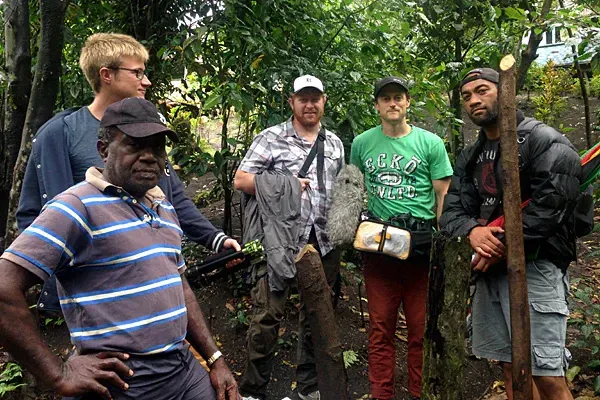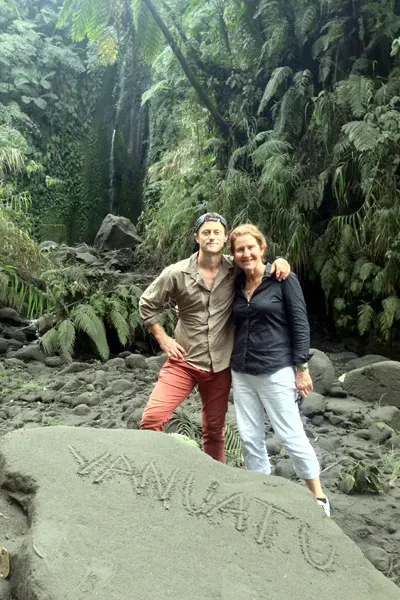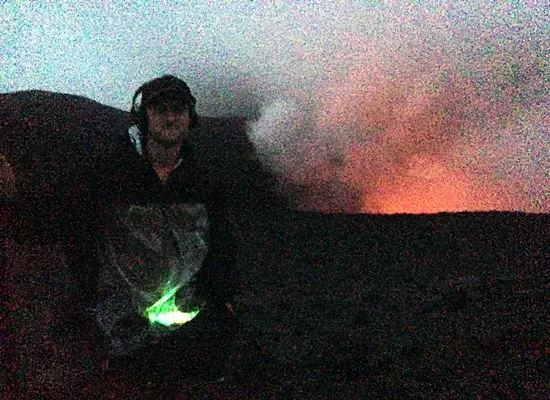Filming in Vanuatu
Written by

Ande Schurr reports on his filming trip to Vanuatu on the island of Tanna and discusses the importance of a teaser trailer.
* * *
New Zealand is so near to the abundant cultural experiences on offer in our neighbouring Pacific Island nations, just a mere three hour flight. There is comfort in being close to one’s home country that counterbalances the strange and different sights that the day unfolds.
I was on Tanna, a southern island on Vanuatu for 10 days recording sound on an American film. Actually it was a teaser trailer to the hopeful feature-length production. The advent of the ‘teaser trailer’ is an institution. It’s akin to the TV pilot. In order to wow investors, the director extracts and shoots a few of the most riveting story and visual elements from the script. It’s a smart, affordable way to give investors a firm understanding of the project.
In Vanuatu, the Melanesian people form the majority. We New Zealanders are, of course, most familiar with our Polynesian neighbours from Samoa, Tonga, the Cook Islands to name but a few and may not be as aware of the people that come from Fiji, Vanuatu, New Caledonia, PNG and the Solomon Islands.
If I might speak generally about the Ni-Vanuatu people they are a healthy group, I rarely saw one over-weight. The fact that there are only two cities in Vanuatu, Port Vila and Luganville, means that the majority of the 250,000 population live in small villages and grow their own food, which, by virtue of isolation, keeps the door firmly shut on the West’s damaging fast food culture.
It so happens that arguably the greatest tourist attraction in Vanuatu, is the volcano on Tanna island, Mount Yasur. This thunderously-sounding, active volcano has apparently been spitting up hot magma for the last 800 years. Its regular roar is heard throughout the island each day and I will never forget recording sound effects near the very rim itself. It felt like the entire earth was going to envelope me. I would grip my boom pole extra tightly and look on relieved that the wind was still taking the sparks of magma in the other direction.
Due to our crew being small, we became a very tight team and each of us took on more than just our official role. The actors were an excellent help in everything from remembering their continuity to sorting out their own makeup and costume. Not something one might normally boast about but let's not be mistaken, we were a very small crew (10 crew and actors in total) in a very isolated part of the world with no immediate exit if things went pear-shaped. I was asked to help organise the crew so I became something like a production manager as well, to help the producer/director focus on her directing. It was a most enjoyable task when you’re helping manage the schedule, keeping track of everyone and acting as the assistant director during the filming. I got to negotiate with chiefs to film on their land, which incidentally was at Port Resolution where Captain James Cook had originally landed in 1774, along with managing local travel logistics and the many local village people who were acting as supporting cast and extras
It was my first taste of ‘production’ and I liked it. It’s an interesting thing when you take a larger role than just your little corner you feel a more complete sense of ownership and enjoyment for the job.
The only problems we had in Vanuatu were with communication. Isn’t it always communication that causes problems no matter what culture! The village people spoke in a gentle, quiet and affirming kind of way that made us think that they understood everything we were saying. The truth is that they often did not sense the urgency or grasp the detail of our requests and so were not able to deliver what they promised. So I became quickly aware of the need for very clear communication, and checking to ensure they understood me.
This communication issue was particularly hard to bear when we were told we owed a lot of money for the use of the land we were filming on. The root cause of this lay in the different tiers of land-ownership created when the French and English, who jointly colonised Vanuatu until 1980 (whereby it gained its independence) tried to return the land to its owners. That involved lengthy court cases and created a further tier of ownership to add to the existing levels: the government film office, tourist operators, the chiefs who live on the land, and now the legal owner of the land.
With the local chief of the Port Resolution village, we brought them a motor mower. But the demarcation lines between villages may suddenly end and move into another chief’s village so we had to be shrewd with those claiming ownership. In these negotiations I found that careful listening, appreciation and assurance that we would not step into any taboo areas helped avoid more financial exchanges.
My experience on Vanuatu was nothing short of immensely satisfying. To be among the lush vegetation, the dramatic volcanic region and the wealth of learning that accompanies liaising with a tribal people. I would visit Vanuatu again and hope I get the chance to help other film crews in the pacific who need a little bit of ‘local’ knowledge.

